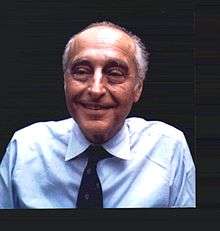Ithiel de Sola Pool
| Ithiel de Sola Pool | |
|---|---|
 | |
| Died | March 11, 1984 (aged 66) |
| Alma mater | University of Chicago |
| Known for | research on technology and societal impact |
Ithiel de Sola Pool (October 26, 1917 – March 11, 1984) was a revolutionary figure in the field of social sciences. Pool led groundbreaking research on technology and its effects on society. He coined the term "convergence" to describe the effect of various scientific innovations on society in a futuristic world. In the course of his career, he would make startlingly accurate predictions about technology and society.[1] In Pool's 1983 book, Technologies of Freedom he described the modes of technology. Digital electronics present convergence between historically separated modes of communication. Theater, news events, and speaking are all increasingly delivered electronically. These modes of communicating ideas are becoming one single grand system.[2]
Early life and education
De Sola Pool was the son of David de Sola Pool, the spiritual leader of the Sephardic Congregation Shearith Israel[3] in New York City. His mother was Tamar Hirschensohn, the Palestinian daughter of Rabbi Chaim Hirschensohn. His sister was Naomi de Sola Pool, a physician.
Pool was initially educated at an Ethical Culture School in New York City. He went on to attend the University of Chicago, where he received a Bachelor of Arts in 1938, a Master of Arts in 1939, and his Ph.D. in 1952. The university was under the direction of Robert Maynard Hutchins, its president from 1929 to 1945, a period in which it became "the birthplace of modern American social sciences."
Career
During World War II, Pool ventured to Washington, D.C., to study and research the effects of Nazi and communist propaganda. He held several prestigious academic appointments, including Stanford University and, eventually, the Massachusetts Institute of Technology, where he joined the MIT Center for International Studies.[4] He remained there for more than 30 years, doing research on the effects of communication technology on global politics.
Work
His earliest interest lay in the study of rhetorical symbols of democracy. The source of his work was the analysis of speechmakers of totalitarian regimes around the world. His desire was to decipher the power and influence of words. However, he would always return to his fascination with technology and communications.
De Sola Pool eventually became the leading authority on the social and political effects of communications. In 1973, his name appeared in The Communications Handbook, which he defined the social and political effects of technological advances in a chapter called "Public Opinion." In 1983, Pool proved to be at the forefront of technological movement with his publications, such as "Forecasting Telephone and Communication Flows."
Pool was reunited with his former mentors Roger Hurwitz and Hirshue Inose to co-author the work A Census of Japan and the US. This would become one of his last forays into the literary world. He once again defined demand toward a global information society.
De Sola Pool was the chair and founder of the MIT political science department.[5] He was often pulled away from MIT to advise the United States and other governments on various matters. In 1965, he wrote "The Kaiser, the Tsar, and the Computer," an essay about a computer-simulated international crisis. Later, his interest in quantitative analysis and communications would contribute to computer models to study human behavior.
The idea of freedom in all forms was extremely important to Pool. As a young man, Pool was a devout Trotskyite, though he quickly became disillusioned with this form of politics after seeing people's ideals used to take away the freedom for which they had initially fought.[6]
Legacy
Pool died in 1984 from cancer. At that point in his career, he was a member of the Council on Foreign Relations, advising several countries around the world. Pool felt that the world was underestimating the importance of communications and technical change. His greatest legacy was his book Technologies of Freedom (1983).
Contributions to social sciences
- Quantitative Analysis - Three Major Advances
- The study of Nazi WWII propaganda and symbols of freedom in speeches of Political leaders.
- Analysis of Political elites = those in power.
- First computer simulation in decision making during crises.
Selected publications
- The Social Impact of the Telephone
- Technologies of Freedom
- Technology without Boundaries
- Politics in a Wired Nation
- The Small World
- Forecasting the Telephone: A Retrospective Technology Assessment of the Telephone
References
- ↑ http://web.mit.edu/cms/People/henry3/converge.pdf
- ↑ http://www.ojr.org/ojr/business/1068686368.php
- ↑ Aviva Ben-Ur (2009). Sephardic Jews in America. NYU Press. ISBN 0-8147-9982-5.
- ↑ http://techtv.mit.edu/collections/mit-cis
- ↑ http://belfercenter.ksg.harvard.edu/files/american_primacy_illusion.pdf
- ↑ http://multitudes.samizdat.net/Cyber-Communism-how-the-Americans
External links
- http://henryjenkins.org/2006/06/convergence_and_divergence_two.htm
- http://www.hup.harvard.edu/catalog/POOTEC.html
- http://www.mediacompolicy.org/
- http://www.mediacompolicy.org/tags/ithiel-de-sola-pool/
- http://cms.mit.edu/images/illustrations/great_minds.jpg